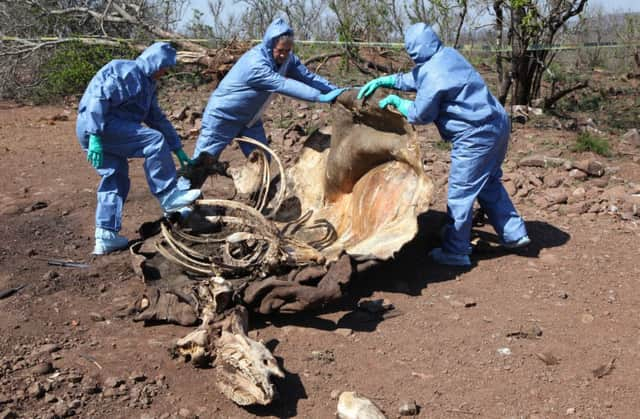Endangered wildlife faces ‘sinister, silent threat’


Campaigners have warned that illegal online sales represent a “sinister, silent threat” to rare and threatened species such as rhinos and tigers.
An investigation by the campaign group International Fund for Animal Welfare (IFAW) has found tens of thousands of animals and animal products being bought and sold around the world, including the UK.
Advertisement
Hide AdAdvertisement
Hide AdIllegal wildlife trade generates an estimated £11.5 billion a year worldwide.
The total value of items offered for sale during the six-week study period was nearly £6.5 million, with British websites accounting for more than £300,000 worth.
These included ivory, turtles, tortoises, owls, exotic birds, monkeys and parts taken from elephants, rhinos, hippos, crocodiles, alligators and big cats.
More than two-thirds of adverts were for wildlife parts and products rather than live animals, with ivory making up nearly a third.
“As poaching reaches alarming levels, wildlife cybercrime poses a sinister, silent threat to endangered species including elephants, reptiles and birds, enabling criminals to go about their grisly business with anonymity,” said IFAW president Azzedine Downes.
CONNECT WITH THE SCOTSMAN
• Subscribe to our daily newsletter (requires registration) and get the latest news, sport and business headlines delivered to your inbox every morning
Animals or parts were advertised by 280 virtual marketplaces in 16 countries, often without supporting documentation.
The researchers found that despite nearly 80 per cent of listings suggesting items were being sold lawfully, only six offered proof.
Advertisement
Hide AdAdvertisement
Hide AdOnline listings for ivory and suspected ivory on UK sites have risen by 47 per cent since 2008.
Most sellers stated their items were antique.
IFAW figures show more than 100,000 elephants have been killed by ivory poachers in the past three years, while the lucrative market for rhino horn has resulted in the deaths of more than 1,000 in South Africa alone.
Ivory products are carved from the tusks and teeth of various species, including the elephant, narwhal, hippo, whale and walrus. The material was once used to make piano keys, billiard balls and other decorative items, but restrictions and bans have been put in place in recent times to prevent key species being hunted to extinction.
Rhino horn is keratin, the same substance that hair, fingernails and hooves are made of. It is used in ornamental carvings and traditional medicine.
The findings have sparked calls for tougher action on cybercrimes against wild animals.
“What is clear is that online marketplaces should work with police and customs to catch wildlife cybercriminals, banning the sale of goods made from endangered wildlife and informing their customers about the poaching crisis and the laws against illegal wildlife trade,” said Philip Mansbridge, UK director of IFAW.
“At the same time governments need to introduce stronger legislation that specifically targets online wildlife crime.”
The most commonly used site was Ebay, which hosted 674 of the ads – one seller posted 58 ivory and suspected ivory items during the study period.
Advertisement
Hide AdAdvertisement
Hide AdThe internet giant has already stepped up efforts to tackle the problem, clamping down on sellers who flout its rules on wildlife products. Ebay director Wolfgang Weber said the firm “does not tolerate” illegal wildlife trade and its policies were “stricter than the law”.
SCOTSMAN TABLET AND IPHONE APPS